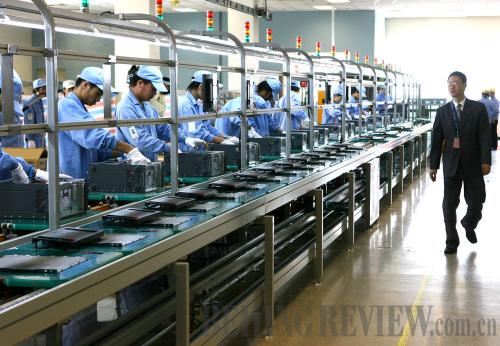|
 |
|
AT FULL STEAM: Workers assemble desktop PCs at a Lenovo factory in Shanghai (CHEN FEI) |
China's personal computer manufacturer Lenovo Group Ltd. overtook U.S.-based Hewlett-Packard Corp., or HP, in the third quarter to become the largest seller of personal computers (PCs) in the world measured by shipments, said the IT research company Gartner Inc. in October.
According to the internationally recognized research firm, Lenovo accounted for 15.7 percent of all PC shipments in the third quarter, while HP held 15.5 percent. Another U.S.-based PC maker, Dell Corp., controlled about 10.5 percent of the market during the period.
Yang Yuanqing, Lenovo Chairman and CEO, said Lenovo would not become complacent.
"Although competition has been fierce in the PC market, I firmly believe there is still room for continuous profit growth," Yang said at a press conference on Lenovo's quarterly financial results held in Beijing on November 8. "Becoming a leading enterprise in the PC market is just a milestone in Lenovo's development, as it is also looking to become a leader in other markets."
Lenovo's success is attributed to its long-term focus on emerging markets and successful overseas M&As. Facing a low profit margin in the PC business and fierce competition from tablet PCs and smart phones, the company is embarking on plans to diversify its businesses.
HP stood atop the rankings as the world's biggest PC maker for the past six years, but its market share loss came amid upheavals in its management and changes in its business plans. At one point, the company had considered spinning off its PC unit, a proposal that was later abandoned by Meg Whitman, HP CEO.
The company has also been hit hard by the world's economic malaise and a shift among customers away from older types of computers toward mobile tablet devices.
Despite a gloomy outlook for PCs, Lenovo's net profit from April to September totaled $303 million, up 20 percent year on year. During the same period, its sales revenue amounted to $16.68 billion, up 22 percent, according to Lenovo's quarterly financial statement. PC sales of the company surged 17 percent while those of the whole world shrank by 5 percent.
Lenovo defied the odds because of some of its acquisitions and relatively high exposure to emerging markets, which are outperforming developed markets in sales, Brent Bracelin, an analyst at Pacific Crest Securities Inc., told China Daily.
In the past, Lenovo learned from HP, IBM and other Western IT companies, Wang Jiping, a senior analyst from the U.S.-based research firm International Data Corp., told China Daily.
Lenovo started to develop its own sales and operations model in 2004 and then acquired IBM's PC division in 2005. Now its business model and strategy have spread to global markets.
Wang said Lenovo in 2009 became the first PC company to classify countries into two categories: emerging markets, such as China, India and Brazil, and mature markets, such as the United States and Japan. Lenovo then developed a different strategy for each. Such a strategy has now been widely adopted among multinational IT companies.
The main reason the company is the top PC seller is its strategy of penetrating into lower-tier cities in China and emerging markets, Wang said.
About six years ago, Lenovo started selling more of its products in China's rural areas, a step that Wang believes will contribute to the company's development in the next five years.
In China, Lenovo has a 34-percent share of the PC market, up 2.4 percentage points year on year, and shipments increased 8 percent year on year in the second quarter of 2012, according to a company statement.
In other emerging markets, Lenovo surpassed Dell and HP earlier this year to occupy the top spot in India and announced a few weeks ago that it would cooperate with a company in Brazil to expand its presence there.
Meanwhile, Lenovo has become the top PC shipper in India and is aggressively expanding in Latin American countries with factories in Brazil and Mexico.
While some Chinese IT industry players have tumbled in overseas M&As, Lenovo has witnessed enormous success from its overseas deals.
In 2005, Lenovo acquired IBM's PC business for $1.25 billion, and it also shouldered $500 million of the latter's debt. The takeover provided the company with American know-how to expand globally. By making Lenovo the third largest PC producer worldwide, the acquisition gave Lenovo's PC business a boost.
| 